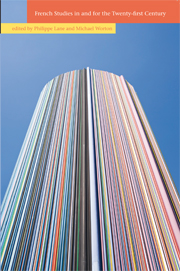Book contents
- Frontmatter
- Contents
- Notes on Contributors
- Foreword by Baroness Jean Coussins
- Foreword by His Excellency Bernard Emié
- Part I Contextualisations
- Part II Research and Public Engagement Strategies
- Part III The Place of Women and Gender in French Studies
- Part IV The Place of Literature
- Part V The Place of Linguistics in French Studies Today
- Part VI Theatre, Cinema and Popular Culture
- Part VII Area Studies, Postcolonial Studies and War and Culture Studies
- 16 An Area Studies Approach in European and Global Contexts: French Studies in Portsmouth
- 17 French Studies and the Postcolonial: The Demise or the Rebirth of the French Department?
- 18 The Development of War and Culture Studies in the UK: From French Studies, Beyond, and Back Again
- Part VIII Adventures in Language Teaching
- Appendices. Addresses to the Future of French Studies Conference
- Index
18 - The Development of War and Culture Studies in the UK: From French Studies, Beyond, and Back Again
from Part VII - Area Studies, Postcolonial Studies and War and Culture Studies
- Frontmatter
- Contents
- Notes on Contributors
- Foreword by Baroness Jean Coussins
- Foreword by His Excellency Bernard Emié
- Part I Contextualisations
- Part II Research and Public Engagement Strategies
- Part III The Place of Women and Gender in French Studies
- Part IV The Place of Literature
- Part V The Place of Linguistics in French Studies Today
- Part VI Theatre, Cinema and Popular Culture
- Part VII Area Studies, Postcolonial Studies and War and Culture Studies
- 16 An Area Studies Approach in European and Global Contexts: French Studies in Portsmouth
- 17 French Studies and the Postcolonial: The Demise or the Rebirth of the French Department?
- 18 The Development of War and Culture Studies in the UK: From French Studies, Beyond, and Back Again
- Part VIII Adventures in Language Teaching
- Appendices. Addresses to the Future of French Studies Conference
- Index
Summary
The place of France and French/Francophone Studies in the development of ‘War and Culture Studies’
France provides a particularly complex and fascinating object of analysis for any investigation into the impact of war on modern and contemporary cultural production and cultural history, having been at war for almost fifty years of the twentieth century. This impact is characterised by radically different experiences and memories of the two world wars, and further complicated by enduring legacies of those wars, and of subsequent, brutal colonial wars. An understanding of the impact that the experiences of these different types of war have made on French cultural, social and political identity is essential for the broader analysis of developments in France throughout the twentieth and into the twenty-first centuries, and indeed its role in European and global affairs. The study of France, then, has played a pivotal role in the development of ‘war and culture studies’ in the UK over the last two decades or so for a number of reasons that are explored in this chapter.
What do we mean by ‘war and culture studies’? This chapter first considers more generally the ‘cultural turn’ in war studies in recent decades, and then looks specifically at the work of the Group for War and Culture Studies (GWACS) and its contributing scholars in developing a particular approach to the relationship between war and culture during conflict and its aftermath in the twentieth and twenty-first centuries.
- Type
- Chapter
- Information
- French Studies in and for the 21st Century , pp. 220 - 232Publisher: Liverpool University PressPrint publication year: 2011



